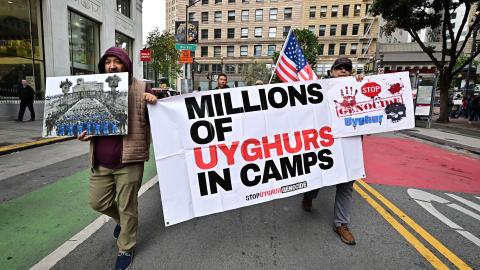Last week, Secretary of State Antony J. Blinken made his second trip to the People’s Republic of China (PRC), where he met with senior PRC officials to discuss a range of bilateral, regional, and global issues. Had Secretary Blinken not raised the plight of the Uyghur people during his visit, it would have been a significant missed opportunity. Thankfully, he reportedly discussed Uyghur and other important human-rights issues with his Chinese counterparts. But given the gravity of the ongoing atrocities Uyghurs face, merely raising the issue is not enough. It is imperative that Congress and the administration follow up these words with action.
Over three years ago, the United States became the first country to make an official determination that the PRC is “committing genocide and crimes against humanity in Xinjiang, China, for targeting Uyghur Muslims and members of other ethnic and religious minority groups.” That determination was based on the reality that at least 1.8 million Uyghurs are held in the CCP’s brutal prison camps. Since that time, Adrian Zenz has found that the CCP currently operates the largest state-run forced-labor program in the world — enslaving an estimated 3 million Uyghurs. There can be no doubt of the dire need for U.S. and global leadership to champion the Uyghur cause.
Secretary Blinken’s visit to the PRC was an opportunity to reaffirm America’s commitment to defending universal human rights. The United States must continue to leverage its diplomatic and economic clout to hold China accountable for its actions and rally international support.
Congress took this moral imperative to heart and recently launched the bipartisan Congressional Uyghur Caucus to raise awareness of the horrors in Xinjiang — mass arbitrary detentions, forced labor, forced sterilization and abortion, sexual abuse, family separation, and cultural erasure.
The bipartisan efforts of Representatives Chris Smith (R., N.J.) and Tom Suozzi (D., N.Y.) underscore a crucial point: human-rights violations, particularly the systematic oppression of the Uyghur people by the Chinese Communist Party, transcend political divides and demand a unified response from the international community. Both co-chairs urged the administration to exert leadership on this issue but also acknowledged that Congress has more work to do; they set out an ambitious agenda of possible legislation for Congress to consider, including the Stop Forced Organ Harvesting Act, the Transnational Repression Policy Act, and the Uyghur Genocide Accountability and Sanctions Act.
The formation of the Congressional Uyghur Caucus serves as a stark reminder of the gravity of China’s actions in Xinjiang, which requires the U.S. to take a principled stand.
Beyond congressional action, the Biden administration must shore up its commitments to defending Uyghur rights. Some next steps the administration should take include strengthening efforts to counter the CCP’s enslavement of the Uyghur people. One way to do that is to improve enforcement of the Uyghur Forced Labor Prevention Act (UFLPA), landmark legislation that banned goods produced with forced labor from entering U.S. markets. Second, the U.S. should make more robust use of its preexisting sanctions authorities under the Uyghur Human Rights Policy Act and the Global Magnitsky Act to financially sanction perpetrators of Uyghur human-rights violations. Shockingly, only two new individuals have been sanctioned over egregious human-rights violations since 2021. Finally, the U.S. must undertake more concerted efforts to secure the release of Uyghur political prisoners, including family members of U.S. citizens like Gulshan Abbas. Few things are more tangible than securing the release of a person who is unjustly detained by an authoritarian regime.
There is much the United States can do to help the Uyghur people. Congress and the administration cannot shirk their responsibility to champion the cause of the oppressed and hold autocratic regimes accountable for their actions. In the face of China’s relentless crackdown on the Uyghurs, inaction is not an option. Now is the time for unwavering resolve and a commitment to coming to the Uyghur people’s aid. Anything less would be a betrayal of America’s values and a grave disservice to the millions who suffer under China’s repressive regime.




















